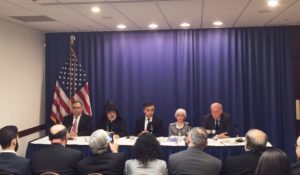WASHINGTON — Leaders and lawyers representing the Catholicosate of Cilicia held a press conference on April 29 at the National Press Club to discuss their lawsuit against the Turkish Government seeking the return of the historic seat of the Catholicosate, located in Sis (currently Kozan), one-time capital of Cilician Armenia.
The press conference featured remarks by Archbishop Oshagan Choloyan, Prelate of the Armenian Apostolic Church of the Eastern United States; Teny Pirri-Simonian, senior advisor to the Armenian Catholicosate of Cilicia; Payam Akhavan, former UN prosecutor at The Hague and lead international counsel in this case, and; Çem Sofuoglu, Turkish human rights lawyer and local counsel. They were joined by Armenian National Committee of America Executive Director Aram Hamparian, who shared the Armenian American community’s support for the just legal claims of the Armenian Church and, more broadly, spoke to the efforts of Armenians worldwide to secure international justice for the Armenian Genocide.
In his remarks, Choloyan reviewed the spiritual history of the Sis Catholicosate, noting the central role it played in Armenian religious life until the Armenian Genocide of 1915. “We are,” said the archbishop, “asking for the return of our land in order to worship there — as we did for a 1000 years. I know that the land is ours. I know that the land recognizes her master.”
In her comments, Pirri-Simonian reviewed the history of this legal case, highlighting the leadership of Catholicos of the Great House of Cilicia Aram I in convening conferences and consulting with international legal experts to prepare a compelling legal case for the return of the Sis Catholicosate. She underscored Aram I’s commitment to convey “more than memory” to coming generations, by securing — in very concrete ways — the return of the Armenian nation’s spiritual heritage.
Lead attorney Akhavan emphasized that: “This case really is about translating the demand for justice into a very concrete case — and that case is the return to the Catholicosate of the Holy See of Cilicia of its historical seat in present day Kozan.” He added that: “It is a concrete demand for the return of property based on the rights of the Catholicosate, the legal personality of which was never extinguished, and it is about the right of religious worship. As someone who is not Armenian but who stands in solidarity with the struggle of the Armenians for justice, this is a remarkable story of hope; it is a remarkable story of the resilience of the human spirit 100 years after these abominable acts that there is still the hope to return.”
Akhavan explained that: “From 1915 onward, Turkey adopted a series of laws on abandoned properties — and of course, abandoned properties is a euphemism used to confiscate the properties of millions of Armenians that once were inhabitants of Ottoman Turkey. Under the 1923 Treaty of Lausanne, the Republic of Turkey undertook under international law to respect the rights of what was termed, under the treaty, non-Muslim minorities.” He added that: “The laws on abandoned properties were designed to deny the Armenians the right to reclaim their properties. In addition, given the tremendous religious significance of this property, the denial of the property rights in this relation also implicates the right of Turkey’s Christian minority, in this case the extended minority that exists in much smaller numbers in Turkey, to freely worship.” Commenting on the legal prospects of the case, Akhavan voiced his “sincere hope that this case will succeed before the Turkish Constitutional Court, failing which the Catholicosate has announced its intention to appeal any adverse judgment to the European Court of Human Rights in Strasbourg.”








